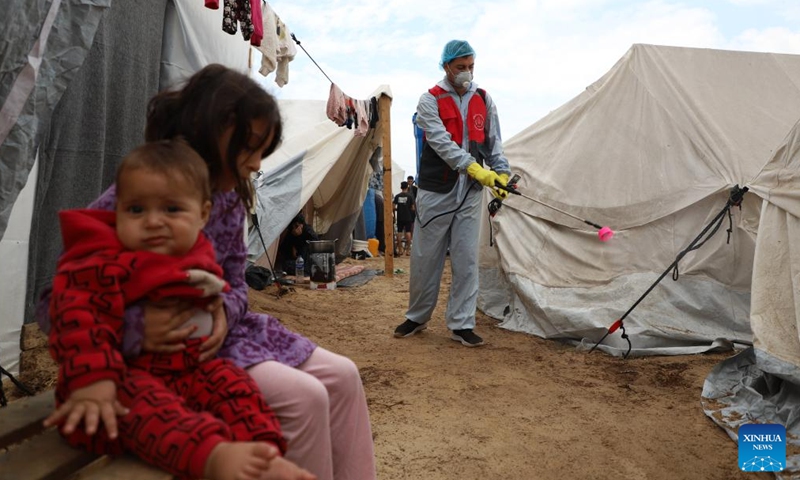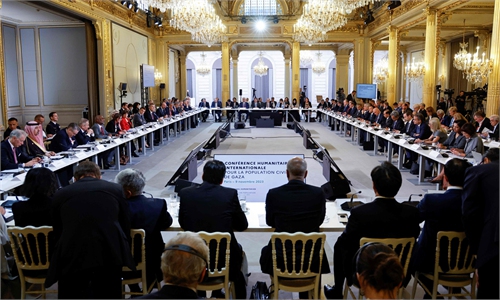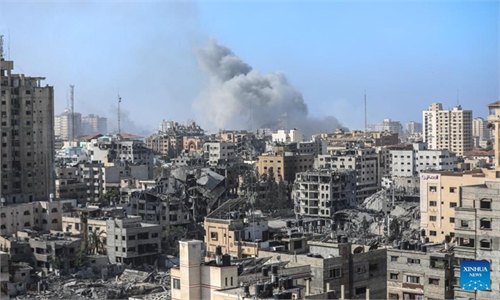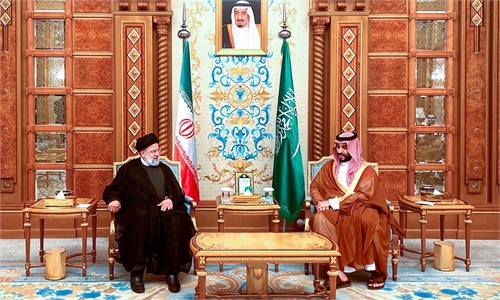
A staff worker disinfects temporary shelters in the southern Gaza Strip city of Khan Younis, on Nov. 12, 2023. (Photo: Xinhua)
China on Monday praised the contribution to calls for a ceasefire and humanitarian assistance for the ongoing Palestine-Israel conflict made by the Saudi-African summit and Arab-Islamic summit, held in Saudi Arabia, saying that China will continue to work with the relevant parties to protect civilians, ease tensions, restart negotiations, and strive tirelessly for peace.
Chinese analysts said the international community has already sent enough messages on "the call for ceasefire", but in order to realize an immediate ceasefire when Israel ignores all calls and warnings to halt its military operations in Gaza, the world, or at least countries in the region that care about the humanitarian situation of Palestinians, also needs measures to impose concrete constraints on Israel..
However, it seems that Arab and Islamic countries do not have a consensus in transforming their call for peace into real actions to force Israel to stop the brutal war, so unfortunately the conflict will continue and the death toll will keep rising, while China will not give up and keep making efforts to promote peace, analysts said.
Stand together
Chinese Foreign Ministry Spokesperson Mao Ning said at a routine press conference on Monday, "The current situation in the Gaza Strip is quite dire, and China supports all efforts aimed at de-escalating the conflict and restoring peace."
More than 11,000 Palestinians, two-thirds of them women and children, have been killed since the war began, according to the Health Ministry in Gaza. About 2,700 people have been reported missing and are thought to be trapped or dead under the rubble, Al Jazeera reported on Monday.
The Saudi-African Summit and the Joint Arab-Islamic Extraordinary Summit, which were recently held in Riyadh, "have sent a clear message of promoting a ceasefire, protecting civilians, increasing humanitarian assistance, and implementing the 'two-state solution,' and we welcome these efforts," Mao said.
The Arab-Islamic summit called for an end to the war in Gaza and rejected the justification of Israel's actions against Palestinians as self-defense. The summit on Saturday condemned "Israeli aggression on the Gaza Strip, war crimes and barbaric and inhumane massacres by the occupation government," a final communiqué of the summit said. The leaders demanded that the UN Security Council adopt "a decisive and binding resolution" to halt Israel's "aggression" in Gaza.
Originally, only the 22 members of the Arab League were expected to participate, but the meeting was later expanded to include the Organization of Islamic Cooperation (OIC), a wider association of 57 mostly Muslim-majority states to which the Arab League countries belong, according to Al Jazeera.
Mao noted that since the Palestinian-Israeli conflict broke out, China has been in close communication with relevant parties to call for ceasefire and restoration of peace. On halting the current conflict, China's position is very much similar to that of the vast Arab, Islamic and African developing countries. "China will work with relevant parties to continue to work relentlessly to protect civilians, deescalate the situation, resume talks for peace and realize peace," said the spokesperson.
Liu Zhongmin, a professor at the Middle East Studies Institute of Shanghai International Studies University, told the Global Times on Monday that "the most feasible way for the international community to force Israel to stop is to pass resolutions in the UN Security Council and to impose constraints on Israel, so that the pressure will be meaningful, otherwise condemnation and words are definitely not enough."
However, with the US' absolute support, Israel doesn't care about the UN Security Council, and the latest summit in Riyadh shows that Arab and Islamic countries failed to reach agreement on taking concrete actions, all of which sent a clear message to Israel: international pressure is limited, said Ma Xiaolin, dean of the Institute for Studies on the Mediterranean Rim at Zhejiang International Studies University.
Washington wants to avoid being criticized by the international community and is also afraid of offending Israel, so it is now calling on it not to target facilities like hospitals and avoid collateral damage on civilians, but has staunchly refused to call for a ceasefire, Ma told the Global Times. "However, this cannot be done, because as long as Israel continues its operation, the civilian death toll will definitely rise."
More tragedies
Mao said at the press conference that "The humanitarian situation in the region has been extremely dire for over a month. The struggling Dar Al-Shifa Hospital is an epitome of the ongoing humanitarian crisis in Gaza."
Israeli forces reached the gates of Gaza City's main hospital on Monday, the primary target in their battle to seize control of the northern half of the Gaza Strip, where medics said patients including newborn babies were dying for lack of fuel, Reuters reported on Monday.
China urges all parties involved to immediately cease fire, protect civilians, increase humanitarian assistance, and alleviate the humanitarian crisis, Mao said, noting that the international community should take concrete measures and make greater efforts to address this issue, she noted.
Israeli ground forces entered Gaza in late October and have quickly encircled Gaza City, the main settlement in the north. Fighting has since been concentrated in a tightening circle around the Al Shifa hospital, the biggest in Gaza, where thousands of civilians sought shelter, Reuters reported.
Israel says Hamas fighters have an underground headquarters in tunnels beneath the hospital and are deliberately using its patients as a shield, which Hamas denies. Gaza health ministry spokesperson Ashraf Al-Qidra, who was inside the Al Shifa hospital in Gaza city, said an Israeli tank was now stationed at the hospital gate, according to media reports.
There was also fresh concern that the war could spread beyond Gaza, with an upsurge of clashes on Israel's northern border with Lebanon, and the US launching air strikes on Iran-linked militia targets in neighboring Syria.
Chinese analysts said the conflict will continue, and if Hamas receives no meaningful support from outside or no new conflict breaks out in other areas that could effectively trouble Israel, it will be just a matter of time before it realizes its military occupation of Gaza and Hamas will lose control in the region. But after about 11,000 people having been killed, maybe more in the future, how Israel will be able to handle a Gaza Strip full of hatred and tears will raise a new question.




